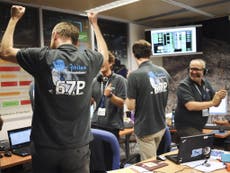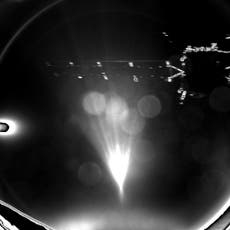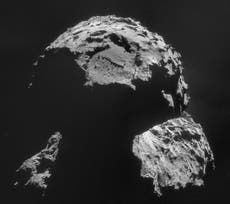When George Osborne bumped up UK funding for the European Space Agency (ESA) by 30 per cent in 2012, he justified the increase in mundane terms: where man “boldly goes”, he often brings back new technologies to speed along our daily lives, from satellite broadband to GPS. The mysteries of existence took a back seat. And yet, in its latest mission, the ESA has been powered – and who cannot be thrilled by it – by a simple and ancient form of curiosity: the desire to know how life on earth began.
With the landing of a probe – Philae – from the Rosetta on Comet 67P this afternoon, humankind is one step and 300 million miles closer to an answer. It is a triumph, in the abstract, for “the real spirit and ambitions of Europe”, as one ESA member put it, but also for the practical ingenuity of the German-based team. Never before has a spacecraft touched down on a comet: scientists described the landing as akin to dropping a fly on a speeding bullet. But then came the bad news: scientists lost contact with Philae, which had harpooned itself to the comet’s surface, jeopardising its work of exploring the make-up of the 2.5m-wide rock. As this newspaper went to press, the fate of Philae was uncertain.
We must hope contact can be restored, because it has the potential to help answer so many vital questions. Not least: how do the water particles on 67P relate to those on earth? An answer to that could tell us much about the origin of life itself.
The failure a decade ago of the Beagle 2, a British-led ESA project, to land on Mars puts relief into the joy in mission control today. All humanity must therefore hope Philae is not lost to us. And even Chancellors with an eye on the purse-strings could be satisfied – on board the Philae is a specifically-developed instrument that may yet be of use in hospitals, submarines and satellites. Two birds, one comet.





Join our commenting forum
Join thought-provoking conversations, follow other Independent readers and see their replies